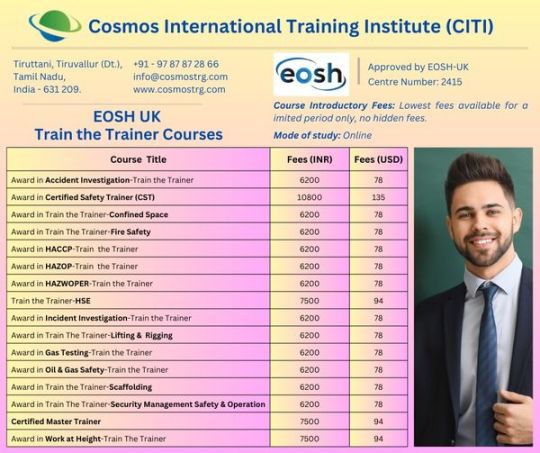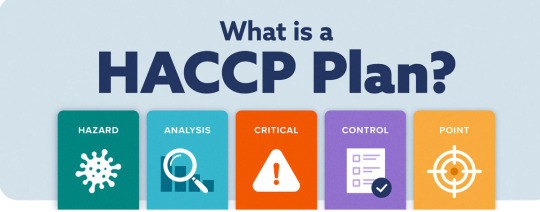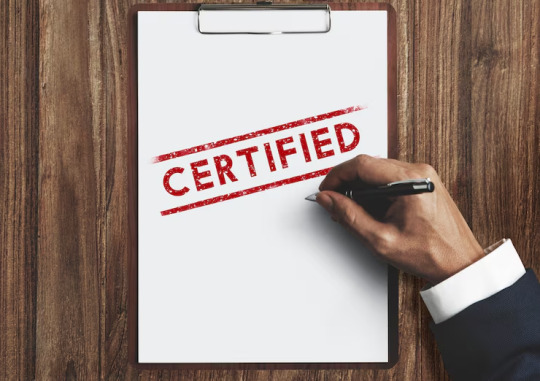#HACCP COURSE
Explore tagged Tumblr posts
Text
The Food Safety Management System Lead Auditor Certification is designed to incorporate a candidate with the knowledge and skills required to assess the compliance of Food Safety Management Systems set up under the requirements of ISO 22000:2018. Not just the international standard, but sector specific technical specifications for Prerequisite Programmes (PRPs) provided in ISO/TS 22002-1:2009 shall also be integrated with the Certification to intimate the participant with the needs of the international food sector.

#FSMS Lead Auditor#Food Safety Management System Lead Auditor Certification#HACCP COURSE#Food Safety Management
0 notes
Text

INTERNATIONAL FOOD SAFETY TRAINING IN KERALA
0 notes
Text
Modern food production and processing must now incorporate the methodical approach to food safety known as Hazard Analysis and Critical Control Points (HACCP). HACCP helps prevent foodborne diseases and guarantees customer safety by identifying, evaluating, and controlling possible hazards across the food supply chain.
#haccp#haccp training#haccp training online#food safety#food safety training#online food safety training#iso training#e learning courses
0 notes
Text
Mastering Envesca Level 3 Food Safety
Discover the importance of mastering Envesca Level 3 Food Safety with this comprehensive guide.
Understanding Envesca Level 3 Food Safety Certification
Envesca Level 3 Food Safety Certification is a comprehensive training program that provides individuals with the knowledge and skills necessary to ensure food safety in their professional roles.
This certification covers a wide range of topics, including food handling and storage, personal hygiene, cleaning and sanitizing, and hazard analysis.
By understanding Envesca Level 3 Food Safety Certification, professionals can effectively implement food safety protocols and prevent foodborne illnesses.
It is important to note that this certification is recognized and respected by industry professionals and regulatory agencies.
Obtaining Envesca Level 3 Food Safety Certification demonstrates a commitment to food safety and can enhance career prospects in the food industry.
Key Concepts Covered in Envesca Level 3 Food Safety Training
Envesca Level 3 Food Safety Training covers a range of key concepts that are essential for maintaining food safety standards.
Some of the key concepts covered in this training include:
- The importance of personal hygiene in preventing food contamination
- Proper food handling techniques to prevent cross-contamination
- Safe practices for food storage and temperature control
- Cleaning and sanitizing procedures to maintain a hygienic environment
- Hazard analysis and critical control points (HACCP) principles
By mastering these key concepts, individuals can effectively implement food safety measures and mitigate the risk of foodborne illnesses.
Benefits of Envesca Level 3 Food Safety Certification
Obtaining Envesca Level 3 Food Safety Certification offers numerous benefits for individuals and organizations involved in the food industry.
Some of the key benefits of this certification include:
- Enhanced knowledge and skills in food safety
- Compliance with food safety regulations and standards
- Reduced risk of foodborne illnesses and contamination
- Improved reputation and customer trust
- Career advancement opportunities
By achieving Envesca Level 3 Food Safety Certification, professionals can demonstrate their commitment to providing safe and high-quality food products and services.
Practical Applications of Envesca Level 3 Food Safety Knowledge
The knowledge gained through Envesca Level 3 Food Safety Training can be applied in various practical scenarios to ensure food safety.
Some of the practical applications of Envesca Level 3 Food Safety knowledge include:
- Implementing proper food handling and storage practices in food establishments
- Training staff members on food safety protocols and procedures
- Conducting regular inspections and audits to identify potential hazards
- Developing and implementing HACCP plans
- Responding effectively to food safety incidents and emergencies
By applying Envesca Level 3 Food Safety knowledge in these practical scenarios, professionals can create a safe and hygienic environment for food preparation and service.
Tips for Successfully Completing Envesca Level 3 Food Safety Training
Completing Envesca Level 3 Food Safety Training requires dedication and commitment. Here are some tips to help you succeed:
- Allocate sufficient time for studying and reviewing course materials
- Take advantage of practice exams and quizzes to assess your knowledge
- Participate actively in training sessions and ask questions when needed
- Seek additional resources, such as books or online materials, to supplement your learning
- Form study groups or seek support from fellow participants
By following these tips, you can enhance your learning experience and increase your chances of successfully completing Envesca Level 3 Food Safety Training.
Keywords Tag: Health and Safety Consultant, HACCP Training, Iosh Managing Safely, Level 3 Food Safety, Food Safety Training, health and safety courses, Health and Safety Training, Health and Safety Training Courses
URLs:
https://www.envesca.co.uk/
https://www.envesca.co.uk/courses/iosh-managing-safely-course/
https://www.envesca.co.uk/consultancy/health-safety-consultant/
https://www.envesca.co.uk/training-courses/food-safety-training/
https://www.envesca.co.uk/courses/highfield-level-2-haccp-training/
https://www.envesca.co.uk/training-courses/health-and-safety-training/
https://www.envesca.co.uk/courses/level-3-food-safety-in-catering-refresher/
Source: https://seoe2zblogs.medium.com/mastering-envesca-level-3-food-safety-1e7a6ab8a210
#Health and Safety Consultant#HACCP Training#Iosh Managing Safely#Level 3 Food Safety#Food Safety Training#health and safety courses#Health and Safety Training#Health and Safety Training Courses
0 notes
Text

#𝐄𝐎𝐒𝐇 - 𝗨𝗞 𝐂𝐨𝐮𝐫𝐬𝐞𝐬#Train the Trainer Courses#Award in Accident Investigation-Train the Trainer#Award in Certified Safety Trainer (CST)#Award in Train the Trainer-Confined Space#Award in Train The Trainer-Fire Safety#Award in HACCP-Train the Trainer#Award in HAZOP-Train the Trainer#Award in HAZWOPER-Train the Trainer#Train the Trainer-HSE#Award in Incident Investigation-Train the Trainer#Award in Train The Trainer-Lifting & Rigging#Award in Gas Testing-Train the Trainer#Award in Oil & Gas Safety-Train the Trainer#Award in Train the Trainer-Scaffolding#Award in Train The Trainer-Security Management Safety & Operation#Certified Master Trainer#Award in Work at Height - Train The Trainer#Contact Us:#Mob:#+919787872866#Email:#[email protected]#Web:#www.cosmostrg.com#WhatsApp Channel :#https://whatsapp.com/channel/0029VaHMYayGufJ45OH4Xo1n#WhatsApp Group :#https://chat.whatsapp.com/IunhDueyuLsEPc9SkB7dlK#eoshcourses
0 notes
Text
to quote my work's haccp regulations online course: all rats are homophobic
2 notes
·
View notes
Text
How to Choose Reliable Frozen Sweet Potato Suppliers
Frozen sweet potatoes—especially in the form of crispy sweet potato frozen fries—have become a staple in both home kitchens and food service operations. But whether you're a restaurant owner, a food distributor, or a retailer, the quality of your final product heavily depends on one thing: choosing the right frozen sweet potato suppliers.
The global demand for frozen sweet potato products is growing fast, and so is the number of suppliers. However, not all suppliers are created equal. Some offer consistency and quality, while others may leave you dealing with delays, poor storage, and inconsistent taste or texture.
In this article, we’ll walk you through what to look for in a reliable frozen sweet potato supplier, so your customers always get the premium taste they expect.
1. Check Their Product Range
Start by reviewing the product catalog of the supplier. A good frozen sweet potato supplier will offer various cuts and styles, such as:
Straight-cut sweet potato fries
Crinkle-cut sweet potato fries
Wedges or chunks
Mashed or cubed options
You want a supplier who understands different market needs and offers products tailored to foodservice, retail, or industrial buyers.
2. Verify Their Quality Standards
This is crucial. A reliable supplier should comply with international food safety standards such as:
ISO 22000
HACCP (Hazard Analysis and Critical Control Points)
BRC Global Standard for Food Safety
These certifications ensure the frozen sweet potato suppliers follow proper sanitation, packaging, and freezing procedures, keeping your products safe and shelf-stable.
Also, ask for details on their freezing method. Flash-freezing is usually best for retaining taste, texture, and nutrients in sweet potato frozen fries.
3. Ask About the Source of Their Sweet Potatoes
A good supplier is transparent about where their sweet potatoes are grown. Look for suppliers who use:
Non-GMO crops
Pesticide-free or low-residue farming practices
Sustainable farming techniques
This is especially important for health-conscious and eco-aware customers.
4. Evaluate Their Storage and Logistics Capabilities
Even the best product can be ruined by poor logistics. Ask:
Do they offer cold chain logistics to maintain consistent temperatures?
Can they deliver internationally or to your location without delays?
How is the product packaged to protect against freezer burn and contamination?
A supplier with strong logistics ensures that your sweet potato frozen fries arrive fresh, on time, and ready to serve.
5. Check for Customization Options
Sometimes you’ll need custom solutions—whether it’s a private label, a specific cut size, or a tailored packaging size for your business model. Reliable frozen sweet potato suppliers should be flexible and open to working with you to meet your needs.
6. Read Reviews and Request Samples
Before making a big purchase:
Ask for product samples to test texture, flavor, and cooking performance.
Read reviews or get references from other businesses who’ve worked with the supplier.
Look at how long the company has been in the business.
A reliable supplier often has repeat clients and strong testimonials.
7. Compare Pricing—but Don’t Focus Only on Cost
Of course, price matters—but low prices can sometimes mean poor quality. Look at:
Cost per kilogram/ton
Shipping and import duties
Discounts for bulk orders
Choose a supplier who offers a balance between quality and value. Remember, your customers are paying for quality sweet potato frozen fries—not just any fries.
8. Test Their Customer Support
Responsive customer service can be the difference between a smooth operation and a business headache. Ask:
How quickly do they respond to inquiries?
Can they resolve delivery issues or quality problems quickly?
Do they assign you a dedicated account manager?
Customer support reflects how seriously a supplier values their relationship with you.
Conclusion: Choose Long-Term Partners, Not Just Product Providers
Reliable sweet potato frozen fries suppliers do more than just ship out products—they help you grow your business. By choosing a supplier who offers consistent quality, customizable options, responsive support, and scalable logistics, you're setting your brand up for long-term success.
Whether you're selling to grocery chains, restaurants, or exporting across borders, finding the right supplier of sweet potato frozen fries is a key business decision. Take your time, compare thoroughly, and always test before committing to a long-term deal.
0 notes
Text
From Recipe to Report: Mastering Your Cookery Assignments with Expert Help
Understanding the Struggles of Culinary Students
In Australia, cookery and hospitality students often face the dual challenge of handling intense practical classes while submitting complex theoretical assignments. With limited time and high academic expectations, students enrolled in cookery programs often find themselves overwhelmed by the pressure.
More Than Just Recipes: What Cookery Assignments Demand
Cookery assignments aren’t just about writing down cooking methods or food preparation steps. These tasks require deep knowledge of food safety, nutrition, kitchen operations, hospitality laws, and sustainability. Additionally, students must demonstrate business and managerial understanding in areas such as budgeting, rostering, and customer service.
What is Cookery Assignment Help?
Cookery Assignment Help refers to expert academic support designed specifically for students enrolled in hospitality and cookery programs. It covers written reports, simulated work-based scenarios, kitchen documentation, HACCP plans, menu design, cost control exercises, and more. The purpose is to help students excel academically without compromising their practical training.
Why Students Choose CookeryAssignments.com
At CookeryAssignments.com, we specialize in assisting hospitality students with professionally written, plagiarism-free assignments aligned with Australian education standards.
✅ 100% Plagiarism-Free Work
Every document is prepared from scratch with proper referencing and originality checks to ensure academic integrity.
✅ Affordable Pricing
We provide high-quality assistance at rates that are student-friendly and competitive in the market.
✅ On-Time Delivery
We never miss deadlines. Our writers ensure timely delivery so you have time to review the work before submission.
Subjects and Units We Cover
We assist with a wide range of cookery and hospitality subjects, including core and elective units such as:
SITXFSA005 — Use hygienic practices for food safety
SITHCCC027 — Prepare dishes using basic methods of cookery
SITXCCS015 — Enhance customer service experiences
SITXHRM008 — Roster staff
SITXFIN009 — Manage finances within a budget
BSBMGT517 — Manage operational plan
Courses We Support
Our services are available for students pursuing the following qualifications:
SIT30821 — Certificate III in Commercial Cookery
SIT40521 — Certificate IV in Kitchen Management
SIT50422 — Diploma of Hospitality Management
SIT60322 — Advanced Diploma of Hospitality Management
Tailored Academic Assistance
Each assignment is customized based on your course guidelines, trainer instructions, and assessment rubrics. Whether it’s a business plan for a simulated restaurant or a food safety case study, we ensure that the content is relevant, concise, and academically sound.
Conclusion: Your Trusted Cookery Assignment Partner
With CookeryAssignments.com, students gain more than just an academic service — they gain a partner in their educational journey. We help you meet deadlines, achieve higher grades, and understand the theory behind your culinary training.
0 notes
Text
Safeguard Every Bite: Join the Best Food Safety Course in UAE with Cresco Safe
In the dynamic food and hospitality sector of the UAE, maintaining top-tier food safety standards is non-negotiable. From bustling kitchens to large-scale food manufacturing units, every stage of food handling demands vigilance, knowledge, and compliance. That’s why enrolling in the best food safety course in UAE has never been more important — and Cresco Safe is here to lead the way.
Why Food Safety Training is Crucial in the UAE
The UAE is home to a booming food industry that serves both residents and tourists from around the world. With strict government regulations and increasing consumer awareness, businesses need trained professionals who understand how to prevent contamination, manage hygiene protocols, and respond to food safety risks efficiently.
A certified course not only ensures legal compliance but also adds value to your role in the industry.
Cresco Safe: Your Partner in Food Safety Excellence
As a recognized Health & Safety Training Institute, Cresco Safe is dedicated to delivering high-impact training programs designed for today’s food industry professionals. Our food safety courses are designed to meet UAE regulatory requirements and international best practices, ensuring participants are fully equipped to handle food safety responsibilities confidently.
What You’ll Gain from the Course:
In-depth understanding of food safety laws and practices
HACCP principles and application
Safe food handling, storage, and preparation techniques
Identification and control of biological, chemical, and physical hazards
Certification recognized across the UAE and GCC
Who Should Take This Course?
Food handlers and processors
Restaurant and catering staff
Quality assurance personnel
Food business owners and supervisors
Hospitality professionals looking to upskill
Whether you're entering the food industry or looking to enhance your qualifications, this is your chance to learn from the best food safety course in UAE.
Why Cresco Safe?
Government-approved and internationally aligned curriculum
Experienced trainers from the food industry
Hands-on learning with practical insights
Interactive sessions (online & in-person)
Strong post-training support and certification guidance
Take Control of Food Safety – Your Customers Deserve It
Empowering your team with proper training not only protects public health but also builds trust and reputation for your business. At Cresco Safe, we don't just teach food safety — we shape responsible professionals.
Ready to Make a Difference?
Join hundreds of food professionals who have chosen Cresco Safe for the best food safety course in UAE. Whether you’re a single learner or a business training an entire team, we have the right program for you.
Register now and serve safety with every bite.
0 notes
Text
Enhancing Compliance and Confidence: Food Safety & Inspection Expertise from Roar FS Consulting
Introduction
In the competitive and highly regulated food industry, businesses must prioritize food safety and regulatory compliance to succeed. Roar FS Consulting stands at the forefront of food safety excellence, delivering expert solutions that empower food establishments across New York City and beyond. With a deep understanding of industry standards and evolving regulatory frameworks, Roar FS Consulting provides end-to-end support, from rigorous food inspection audits to specialized food safety training programs such as ServSafe and NYC Food Protection certification. Whether you're running a restaurant, catering business, manufacturing unit, or food retail operation, our tailored services ensure you meet and exceed health department expectations.
The Critical Role of Food Inspection Audits
Food inspection audits are more than just a compliance requirement; they are essential tools for risk mitigation, brand protection, and consumer trust. At Roar FS Consulting, our food inspection audits are comprehensive evaluations conducted by seasoned professionals with in-depth knowledge of federal, state, and local regulations.
Our audits mimic official NYC health inspections, identifying potential violations before they impact your operations. We assess cleanliness, food handling procedures, employee hygiene, pest control, and storage practices, offering actionable feedback that promotes long-term improvements. With our guidance, businesses reduce the likelihood of costly citations, shutdowns, or damage to reputation.
NYC Health Inspection Preparedness
Navigating a NYC Health Inspection can be intimidating without proper preparation. Roar FS Consulting equips clients with detailed inspection-readiness checklists, corrective action plans, and real-time coaching. We simulate health inspections using criteria followed by the NYC Department of Health and Mental Hygiene (DOHMH), giving businesses a preview of what inspectors will examine.
By identifying weak points in advance—such as temperature control issues, sanitation shortfalls, or improper food labeling—we help prevent common violations. Our clients gain peace of mind knowing that they are always inspection-ready, not just reacting when regulators arrive.
Professional Food Safety Training and Certification
Effective food safety begins with well-informed employees. Roar FS Consulting offers industry-recognized food safety training that promotes a proactive food safety culture within organizations. From entry-level workers to management staff, we provide tailored training programs such as:
ServSafe Certification: A nationally recognized certification covering critical areas like cross-contamination, time and temperature control, personal hygiene, and cleaning/sanitizing. Our certified trainers ensure participants gain the knowledge needed to pass the exam and apply skills in real-world settings.
NYC Food Protection Course Prep: This city-mandated certification is required for supervisors in restaurants and other food service establishments. Our focused training streamlines preparation for the NYC Food Protection Exam, emphasizing key areas such as pest control, allergen awareness, and proper food handling techniques.
Customized Workshops: We design on-site and remote workshops to address business-specific needs—covering everything from basic food safety principles to advanced protocols in response to new regulations or emerging hazards.
By equipping your team with the right knowledge and credentials, Roar FS Consulting helps foster accountability and vigilance at every level of your operation.
Implementing HACCP for Consistent Quality and Compliance
The Hazard Analysis and Critical Control Points (HACCP) system is a globally recognized framework for managing food safety risks. At Roar FS Consulting, we specialize in the development and implementation of custom HACCP plans that reflect the unique operations of our clients—whether they are in food manufacturing, distribution, or service.
Our consultants:
Identify biological, chemical, and physical hazards across all stages of food production.
Establish preventive controls and monitoring strategies.
Design documentation and record-keeping systems for traceability and accountability.
Train staff in HACCP principles to ensure company-wide understanding and adherence.
With regulatory bodies such as the FDA and USDA requiring HACCP compliance in many sectors, our expertise ensures your business not only meets but exceeds those mandates.
Expert Food Safety Consultants for Ongoing Support
Food safety is not a one-time event—it is an ongoing responsibility. Our team of dedicated food safety consultants partners with businesses for continuous compliance and growth. Whether you’re launching a new venture, expanding to new locations, or recovering from a failed inspection, we provide expert strategies and hands-on assistance tailored to your goals.
Roar FS Consulting offers:
Regulatory consulting to navigate complex food codes and licensing requirements.
Corrective action plans for establishments that have received violations.
Crisis management strategies for contamination events, foodborne illness outbreaks, or health department closures.
Long-term consulting arrangements to build sustainable food safety systems.
Our consultants act as an extension of your internal team, bringing industry best practices and current regulatory insights to every engagement.
Bridging the Gap Between Compliance and Excellence
At Roar FS Consulting, we believe that food safety should not be viewed as a checklist but as a foundation for business excellence. Our solutions empower food businesses to go beyond minimum standards, creating environments where safety, quality, and customer trust thrive together.
By aligning your business with our strategic expertise, you benefit from:
Reduced risk of fines, shutdowns, or lawsuits.
Improved employee performance and food safety knowledge.
Enhanced brand image and customer satisfaction.
Streamlined operations through efficient safety systems.
Why Food Safety Compliance Is More Important Than Ever
The modern food landscape is shaped by increasing consumer awareness, stricter regulations, and higher expectations. From allergen control to digital monitoring systems, food businesses must stay ahead of emerging trends and challenges. In New York City, where competition is fierce and health department grades are public, even a minor lapse in compliance can have serious consequences.
By investing in services such as food inspection audits, HACCP planning, and ServSafe certification, you ensure your business is future-ready. Roar FS Consulting stands as your proactive partner in this journey, delivering insights and support that evolve with your needs.
0 notes
Text

A HACCP (Hazard Analysis and Critical Control Points) course is designed to educate participants on the principles and practical implementation of food safety systems. This course is essential for professionals involved in the food industry, including production, processing, packaging, and distribution.
0 notes
Text
M.Sc. in Food Technology – Shape the Future of Food with Dev Bhoomi Uttarakhand University
What is M.Sc. in Food Technology?
The M.Sc. in Food Technology is a two-year postgraduate program designed to provide students with in-depth knowledge of food science, preservation techniques, quality assurance, nutrition, and innovative food processing methods. If you are passionate about improving the quality and safety of what people eat, then this course is perfect for you.
Dev Bhoomi Uttarakhand University (DBUU) offers an industry-oriented M.Sc. in Food Technology program that combines theoretical learning with practical application, ensuring that students are ready to lead the food industry revolution.
Why Choose Dev Bhoomi Uttarakhand University for M.Sc. in Food Technology?
Choosing the right institution is crucial for academic and career success. Here's why DBUU stands out:
1. Industry-Focused Curriculum
The M.Sc. in Food Technology program at DBUU is designed in collaboration with food industry experts. The curriculum covers areas like food microbiology, food packaging, food additives, quality control, food safety regulations (FSSAI, ISO, HACCP), and emerging technologies in food processing.
2. Experienced Faculty
DBUU boasts a team of experienced and research-driven faculty members who bring deep academic knowledge and hands-on industry experience. They mentor students not just for exams, but for successful careers.
3. Advanced Labs and Research Facilities
With state-of-the-art laboratories, DBUU provides the infrastructure needed to conduct experiments in food analysis, biochemistry, and preservation techniques. This exposure gives students practical skills that are vital in real-world scenarios.
4. Internship and Placement Support
DBUU has strong tie-ups with leading food processing companies, research institutes, and FMCG giants. Students get internships and placement opportunities in organizations like Nestlé, Amul, ITC, Britannia, Dabur, and more.
Course Highlights: M.Sc. in Food Technology at DBUU
Duration: 2 years (4 semesters)
Eligibility: B.Sc. in Food Technology or relevant science background (Biotech, Microbiology, Chemistry)
Program Structure:
Food Chemistry and Analysis
Food Microbiology and Safety
Nutrition and Dietetics
Dairy and Meat Technology
Food Laws and Standards
Food Biotechnology
Packaging and Preservation Technologies
Research Methodology and Dissertation
This holistic approach ensures that students are exposed to all facets of food technology.
Career Scope After M.Sc. in Food Technology
The food industry is one of the fastest-growing sectors in India and globally. With a master's degree, graduates can pursue diverse roles such as:
1. Food Technologist
Ensure the safety, quality, and nutritional value of food products during development and manufacturing.
2. Quality Assurance Manager
Oversee compliance with food safety standards and quality control procedures in production units.
3. Research Scientist
Work in R&D departments of food companies or research institutions to develop new food products or improve existing ones.
4. Nutritionist/Diet Consultant
Use knowledge of food composition and health to guide consumers or organizations on diet planning.
5. Regulatory Affairs Executive
Manage documentation and regulatory compliance related to food labeling, packaging, and licensing.
6. Academic and Teaching Roles
With further research (Ph.D.), one can enter into teaching and academic research in reputed colleges and universities.
Global Opportunities in Food Technology
The demand for qualified food technologists is rising not only in India but also globally. Countries like Canada, Australia, UAE, and the USA have significant demand for professionals in food science, quality control, and food safety. With a M.Sc. in Food Technology from Dev Bhoomi Uttarakhand University, students can confidently explore international job markets.
Research & Innovation at DBUU
Dev Bhoomi Uttarakhand University encourages students to take up research projects and publish papers in reputed journals. Students are given opportunities to participate in conferences, seminars, and innovation challenges. The M.Sc. program includes a dissertation in the final semester, where students can work on real-time industry problems or innovate food-based solutions.
Student Testimonials
“I chose DBUU for my M.Sc. in Food Technology because of its academic excellence and practical training. The faculty is supportive, and the labs are well-equipped. I got placed in a reputed food company even before completing my degree.” – Riya Sharma, Batch 2022
“The exposure DBUU provides is unmatched. From field visits to food industries to guest lectures by professionals, everything helped shape my career path.” – Nikhil Rawat, Batch 2023
Admission Process for M.Sc. in Food Technology at DBUU
Online Application: Visit www.dbuu.ac.in and fill out the online application form.
Eligibility Check: Submit academic documents for verification.
Personal Interview (if applicable)
Admission Confirmation: Pay the fee to confirm your seat.
Scholarships are available for meritorious students and those from economically weaker backgrounds.
Conclusion
To sum up, an M.Sc. in Food Technology from Dev Bhoomi Uttarakhand University is more than just a degree—it’s a career-transforming experience. With expert faculty, world-class infrastructure, and excellent industry connections, DBUU empowers students to become future leaders in the food industry.
0 notes
Text
Mastering Online Health Courses
Discover how to excel in online health courses and maximize your learning potential.
Benefits of Online Health Courses
Online health courses offer a range of benefits for learners. One of the main advantages is the flexibility they provide. With online courses, you can study at your own pace and fit your learning around your existing commitments. This flexibility is particularly beneficial for individuals who are working or have other responsibilities.
Another benefit of online health courses is the accessibility they offer. You can access course materials and resources from anywhere with an internet connection. This means you can study from the comfort of your own home or even while traveling. Online courses also often provide interactive learning materials, such as videos and quizzes, which can enhance your understanding and engagement.
Additionally, online health courses allow you to learn from experts in the field. Many online courses are developed and taught by experienced professionals, ensuring that you receive high-quality education. You can also connect with fellow learners from around the world, providing opportunities for collaboration and networking. Overall, online health courses provide convenience, accessibility, and expertise, making them an excellent choice for individuals looking to enhance their knowledge and skills in the field of health.
Tips for Success in Online Learning
To succeed in online health courses, it is important to establish a routine and set dedicated study times. Treat your online course like a regular class and allocate specific blocks of time for studying and completing assignments. Another tip for success is to actively participate in online discussions and forums. Engaging with your peers and instructors can enhance your learning experience and provide opportunities for asking questions and sharing insights.
Additionally, stay organized by keeping track of deadlines and creating a study schedule. Break down larger assignments into smaller tasks and set realistic goals for each study session. Finally, make use of available resources and support. Online health courses often provide access to additional materials, such as textbooks or supplementary readings. Take advantage of these resources to deepen your understanding of the subject matter.
Navigating Online Health Course Platforms
Online health course platforms can vary in their layout and features. To navigate these platforms effectively, familiarize yourself with the different sections and tools available. Start by exploring the course syllabus or outline to understand the structure and content of the course. This will help you plan your study schedule and prioritize your learning objectives. Next, take advantage of any orientation materials or tutorials provided. These resources can guide you through the platform's features, such as how to access course materials, submit assignments, and participate in discussions.
As you progress through the course, regularly check for announcements and updates from your instructor. These communications may contain important information or reminders about upcoming assignments or changes to the course schedule.
Finally, don't hesitate to reach out to your instructor or the platform's support team if you encounter any technical issues or have questions about navigating the platform. They are there to assist you and ensure a smooth learning experience.
Effective Study Strategies for Online Health Courses
Developing effective study strategies is crucial for success in online health courses. Consider implementing the following techniques to enhance your learning experience. First, create a dedicated study space that is free from distractions. This could be a quiet corner in your home or a local library. Make sure you have all the necessary materials, such as textbooks, notebooks, and a reliable internet connection.
Next, break down the course material into manageable chunks. Instead of trying to study everything at once, focus on specific topics or chapters. This will help you retain information more effectively and prevent overwhelm. Additionally, engage in active learning by taking notes, asking questions, and summarizing key concepts. Actively engaging with the material will reinforce your understanding and improve retention.
Furthermore, establish a study schedule and stick to it. Consistency is key in online learning. Set aside specific times each day or week for studying and make it a priority. Lastly, do not forget to take breaks and practice self-care. Online learning can be demanding, so make sure to give yourself time to rest and recharge.
Utilizing Resources for Online Health Courses
Online health courses often provide a wide range of resources to support your learning journey. Take advantage of these resources to enhance your understanding and maximize your learning potential. First, access the course materials provided. These can include lecture notes, slides, textbooks, and additional readings. Review these materials thoroughly to reinforce your understanding of the subject matter.
Additionally, explore any supplementary resources offered by the course, such as online libraries, research databases, or video lectures. These resources can provide additional perspectives and deepen your knowledge. Furthermore, engage with online forums and discussion boards. These platforms allow you to connect with fellow learners, ask questions, and share insights. Participating in discussions can enhance your understanding and provide different perspectives on the course material.
Lastly, seek support from your instructor or teaching assistants if you need clarification or additional guidance. They are there to help you succeed and can provide valuable insights and feedback.
Keywords Tag: Health and Safety Consultant, HACCP Training, Iosh Managing Safely, Level 3 Food Safety, Food Safety Training, health and safety courses, Health and Safety Training, Health and Safety Training Courses
URLs:
https://www.envesca.co.uk/
https://www.envesca.co.uk/courses/iosh-managing-safely-course/
https://www.envesca.co.uk/consultancy/health-safety-consultant/
https://www.envesca.co.uk/training-courses/food-safety-training/
https://www.envesca.co.uk/courses/highfield-level-2-haccp-training/
https://www.envesca.co.uk/training-courses/health-and-safety-training/
https://www.envesca.co.uk/courses/level-3-food-safety-in-catering-refresher/
Source: https://paricasino.info/mastering-online-health-and-safety-training-courses/
#Health and Safety Training#Health and Safety Consultant#HACCP Training#Iosh Managing Safely#Level 3 Food Safety#Food Safety Training#health and safety courses#Health and Safety Training Courses
0 notes
Text
How to Earn Your Louisiana Food Manager Certification: A Step-by-Step Guide

Earning your Louisiana Food Manager Certification is a required step for many professionals working in food service. Whether you manage a restaurant, cafeteria, catering operation, or healthcare food program, having the proper certification shows that you understand advanced food safety principles and are compliant with local and national regulations.
AAA Food Handler offers a fully online Food Manager Certification program that is affordable, accessible, and approved. This guide outlines exactly who needs the certification, what the course includes, how to complete the exam, and how to stay compliant in Louisiana.
Who Is Required to Hold a Food Manager Certification in Louisiana?

In Louisiana, most food establishments are required to have at least one Certified Food Protection Manager (CFPM) on duty during all hours of operation. This rule applies to:
Restaurants and food courts
School food programs
Grocery store delis and bakeries
Food trucks and mobile vendors
Hotel kitchens and banquet services
Healthcare and long-term care food facilities
If you are responsible for managing or supervising food preparation, you must hold a valid Food Manager Certification.
What Is the Food Manager Certification?

The Food Manager Certification confirms that you have passed a nationally accredited food safety exam and are qualified to oversee food handling practices in a facility. This certification:
Demonstrates that you understand contamination prevention, temperature control, and personal hygiene policies
Is accepted by health departments in Louisiana and nationwide
It is required by law for food managers in many states, including Louisiana
What Topics Are Covered in the Training?

The AAA Food Handler training prepares you for the Food Protection Manager Certification exam by covering essential topics, including:
Time and temperature control for TCS foods
Cross-contamination and allergen prevention
Personal hygiene and employee illness reporting
Proper cleaning, sanitizing, and equipment handling
Safe food storage and preparation
HACCP (Hazard Analysis and Critical Control Points) basics
Leadership and staff supervision techniques
The training is focused on practical, real-world application for managers.
How Long Does the Course and Exam Take?
The entire certification process can be completed in one day. Here’s what to expect:
Training course: 4 hours (self-paced)
Exam: 2 hours (with 2 free attempts included)
Certificate: Download instantly after passing
The course is available 24/7 and can be completed on a computer or mobile device.
Is the Exam Accredited?
Yes. The AAA Food Handler Food Manager Certification exam is accredited by the ANSI National Accreditation Board (ANAB) and recognized by the Conference for Food Protection (CFP). This ensures that the exam meets the highest national food safety standards and is accepted by health departments across all 50 states.
Is the Certification Accepted in Healthcare and Dietary Settings?
Yes. The AAA Food Handler program meets the food safety requirements outlined in CFR § 483.60, which regulates food service in healthcare and long-term care facilities. This certification is also a qualifying step for individuals pursuing the Certified Dietary Manager (CDM) pathway.
What Do You Receive After Passing the Exam?
Once you pass the exam, you will receive an official Food Manager Certificate:
Downloadable instantly
Valid for up to 5 years
Accepted by local and state health departments
Can be printed or stored digitally for inspections
This certificate serves as proof of compliance during health inspections.
How Much Does the Program Cost?
The AAA Food Handler and Food Manager Certification starts at $49.95. This includes:
Full online training
Practice exam and sample questions
Two exam attempts
Instant access to your certificate
U.S.-based customer support
There are no hidden fees. You pay once and get everything you need to become certified.
Are Group Discounts Available?
Yes. If you're training a team, bulk pricing is automatically applied:
10–49 users: Save $10 per person
50–99 users: Save $15 per person
100–199 users: Save $20 per person
200+ users: Save $30 per person
AAA Food Handler also provides a group dashboard so you can track training, access certificates, and manage compliance for your team.
Why Choose AAA Food Handler?
AAA Food Handler is trusted by over 1 million food workers across the United States. Clients include:
McDonald’s
Panera Bread
Dunkin’
Panda Express
Olive Garden
Chick-fil-A
Our certification program offers:
✅ ANSI National Accreditation Board (ANAB) accreditation ✅ Instant certificate after passing ✅ Free retest included ✅ Price match guarantee ✅ Satisfaction guarantee ✅ U.S.-based support ✅ Bulk tracking dashboard for franchises and HR
Get Certified Today

✔ 100% Online Training + Exam ✔ Just $49.95 ✔ ANSI National Accreditation Board (ANAB) Accredited ✔ Recognized by the Conference for Food Protection (CFP) ✔ Certificate Valid for 5 Years ✔ Accepted by Health Departments in Louisiana ✔ Available in English and Spanish ✔ Bulk Discounts for Teams
Pass Fast. Get Certified. Stay Compliant.
1 note
·
View note
Text
ISO 22000 Internal Auditor Training
ISO 22000 Internal Auditor Training
About the ISO 22000 Internal Auditor Course
ISO 22000 Internal Auditor Training is a program that provides individuals with the necessary skills and knowledge to perform internal audits of a food safety management system. The program covers topics such as hazard identification, risk assessment, corrective actions, and management review. It also teaches participants how to evaluate the effectiveness of a food safety management system.
Importance
Internal auditing entails an in-depth study of ISO 22000, which is essential for developing and maintaining an effective food safety management system. Internal auditors can aid in the maintenance of a successful system by identifying and addressing any areas of non-compliance. They can also offer management important feedback on the efficacy of their food safety management system.
Internal auditor training ensures that internal auditors are up to date on the most current food safety standards and technologies. They can also assist companies in achieving and maintaining ISO 22000 certification.
Benefits
It builds a comprehensive understanding of the ISO 22000 standard.
It provides an overview of food safety hazards and how to identify, assess and control them.
It equips participants with the skills necessary to conduct internal audits in compliance with ISO 22000 requirements.
It enhances knowledge of food safety management principles and practices.
It improves the ability to identify food safety issues and recommend corrective actions.
It enhances communication and teamwork skills.
It promotes professional development and career growth.
Who Can Attend?
The ISO 22000 Internal Auditor Training program is designed for individuals who are responsible for auditing a food safety management system. It is also beneficial for individuals who want to learn more about food safety management principles. This includes:
Food safety managers
HACCP team members
Quality assurance personnel
Pre-requisites
There are no mandatory pre-requisites for the ISO 22000 internal auditor training program. However, it is recommended that participants have a basic understanding of ISO 22000 and a basic understanding of auditing.
How to Attend a Training Program?
Attending a training program can be done in several ways. You can attend an in-person training program, or you can take an online training program. In-person training programs are offered at various locations around the world. Online training programs are offered through various providers, and participants have the option to purchase a self-paced or instructor-led program.
Conclusion
ISO 22000 Internal Auditor Training is a comprehensive program that provides individuals with the knowledge and skills necessary to conduct internal audits of a food safety management system. The curriculum covers numerous essential topics, such as hazard identification, risk analysis, corrective actions, and management review. It also teaches participants how to evaluate the effectiveness of a food safety management system.
Read more : iso 22000 internal auditor course
0 notes
Text
How To Start a Tiffin Service in Slough, UK?
Starting a tiffin service in Slough, UK, can be a rewarding business opportunity, especially with the growing demand for home-cooked meals among students, working professionals, and families. A tiffin service provides freshly prepared meals delivered daily or several times a week.
Windsor Food Service provides reliable, high-quality meal solutions that cater to diverse tastes, utilising fresh ingredients and delivering exceptional customer service.
Here’s a detailed guide on how to start your tiffin service in Slough, covering planning, legal requirements, marketing, and more.
1. Research the Market
Begin by understanding the local demand. Slough has a diverse population, including South Asian communities who are familiar with tiffin services. What type of food people want (vegetarian, non-vegetarian, vegan, halal, etc.)
Meal preferences (spicy/mild, traditional dishes, etc.)
Pricing expectations
Delivery time preferences
Understanding your target audience helps tailor your offerings effectively. Food delivery in Slough offers convenient, fast options from local restaurants and tiffin services, bringing delicious meals straight to your doorstep.
2. Create a Business Plan
A solid business plan outlines your vision and how you’ll achieve it. Include the following:
Business name and branding Choose a unique, catchy name that reflects home-cooked meals or cultural heritage.
Menu options Offer flexible meal plans (daily, weekly, or monthly) and consider providing customizable meal options.
Pricing strategy Stay competitive but ensure profit. Consider costs for ingredients, packaging, delivery, and labour.
Start-up costs Include kitchen setup, cooking utensils, packaging, transportation, marketing, and licenses.
Revenue projections Estimate income based on the number of customers and the pricing structure.
Food service in Burnham provides fresh, home-cooked meals with prompt delivery, catering to local tastes and dietary preferences for every customer.
3. Register Your Business
To operate legally in the UK, you must:
Register as a food business with the local authority (Slough Borough Council). This should be done at least 28 days before starting operations.
Choose a legal structure: You can register as a sole trader, a partnership, or a limited company. Each has different tax and legal responsibilities.
Get insured: Public liability insurance and product liability insurance are essential. You may also want business interruption and vehicle insurance if you’re handling deliveries.
Food service in Langley offers delicious, freshly prepared meals with reliable delivery, catering to diverse dietary needs and local community preferences daily.
4. Follow Food Safety and Hygiene Regulations
Food safety is crucial. Here are key requirements:
Get a Food Hygiene Rating: An inspector from Slough Borough Council will visit your kitchen. Aim for a rating of 4 or 5.
Take a Food Hygiene Course: A Level 2 Food Safety and Hygiene for Catering course is recommended. These can be completed online.
Follow the HACCP system: Hazard Analysis and Critical Control Points (HACCP) is a food safety management system required in the UK.
Kitchen setup: If cooking from home, ensure your kitchen meets hygiene and cleanliness standards. Separate raw and cooked foods, store food correctly, and maintain cleanliness.
Food service in Ascot delivers freshly cooked, high-quality meals with prompt service, catering to a variety of dietary preferences and ensuring customer satisfaction every time.

5. Design Your Menu
A varied and attractive menu is key to customer retention. Offer:
Daily changing menus to avoid monotony
Traditional dishes (e.g., dal, sabzi, rice, chapati)
Optional add-ons like snacks or desserts
Special diet options: gluten-free, vegan, low-carb
Offer sample tiffins to new customers for them to try before committing to a full plan.
Food service in Maidenhead offers fresh, home-style meals with timely delivery, catering to diverse tastes and dietary needs across the local community.
6. Plan Delivery Logistics
Timely delivery is essential for success. You can:
Deliver the food yourself
Hire a delivery driver
Partner with a local courier service
Use insulated food containers to keep food warm. Optimize delivery routes to reduce fuel costs and time. Food service in Marlow offers freshly prepared, delicious meals with reliable delivery, catering to local demand for high-quality food and diverse dietary preferences.
7. Marketing Your Tiffin Service
Use both online and offline strategies to reach customers:
Create a website: Include your menu, prices, contact information, and customer testimonials.
Social media marketing: Promote your dishes on platforms like Instagram, Facebook, and TikTok with appealing photos and videos.
Local ads: Use community boards, newspapers, and local radio.
Google My Business: Register so people in Slough can find you easily.
Referral programs: Offer discounts to customers who refer friends or family.
Food delivery services in Bourne End offer convenient, freshly made meals delivered promptly, catering to a variety of tastes and dietary requirements.
8. Customer Service and Feedback
Great customer service builds loyalty. Always:
Deliver on time
Be responsive to customer feedback
Maintain consistent food quality
Offer refunds or replacement meals if issues arise
Encourage online reviews and use constructive feedback to improve.
Food service in Gerrards Cross delivers high-quality, freshly prepared meals with efficient service, tailored to meet local tastes and dietary preferences daily.
9. Scale and Expand
Once your service gains popularity, consider:
Offering weekend specials or catering for small events
Partnering with local offices or universities
Hiring more staff for cooking and delivery
Introducing a subscription-based mobile app for easier ordering
Indian tiffin service near me offers authentic, home-cooked meals delivered fresh daily, providing convenient, flavorful options for busy individuals and families.
10. Legal and Financial Compliance
Keep accurate records of expenses and income
File taxes annually (register for Self Assessment if you’re a sole trader)
Register for VAT if your turnover exceeds the threshold (currently £90,000)
Consider hiring an accountant or using accounting software to manage finances efficiently.
Gujarati tiffin service near me offers traditional, flavorful home-cooked meals delivered fresh daily, perfect for those craving authentic Gujarati cuisine conveniently.
Final Thoughts
Starting a tiffin service in Slough is a promising venture if approached with careful planning and dedication to quality. With strong demand for fresh, home-style meals and a growing population, your service can thrive by focusing on hygiene, consistency, and customer satisfaction.
By adhering to UK food safety regulations and delivering exceptional value, you can establish a loyal customer base and grow your business sustainably. Punjabi tiffin service near me delivers authentic, hearty home-cooked Punjabi meals daily, offering rich flavors and convenient, fresh food for every appetite.
#Start a Tiffin Service in Slough#Start a Tiffin Service in UK#Start a Tiffin Service#Slough Tiffin Service#How to start a tiffin service in slough uk online#Tiffin service business plan#Tiffin service business#How to start tiffin service online#Indian Tiffin Service#Tiffin Service Uk#Tiffin Service#Food#Tiffin
0 notes